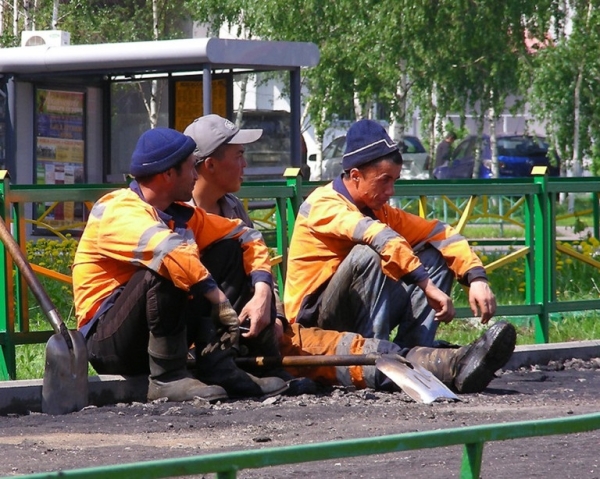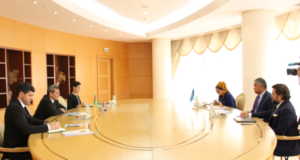
Photo: Lori
The rhetoric of the Russian media when covering the topic of migration has become more negative and concentrated on the opposition of “friends” and “strangers”. Rustam Gulov, a Tajik specialist in new media, came to this conclusion after the analysis. The data he collected is cited by the Cabar.asia .
Several recent high-profile crimes in Russia, the main suspects of which were citizens of Tajikistan, have caused an increase in anti-migrant sentiment both in society and in the media.
Conditionally positive news related to the opportunities provided to migrants, as well as the benefits they receive in different countries, including Russia itself.
6 times more negative
Despite the fact that almost 80% of the materials had a neutral tone, it is worrying that more than 18% covered the topic of migration in a negative context. Less than 3% had a positive tone, which is 6 times less than materials with a negative tone.
At the same time, the data is averaged.
If you look at them in the context of individual years, the situation turns out to be different.
Every third article about migration was written in a negative tone and focused on problems, difficulties and risks
In terms of materials for 2022, the picture is slightly different. The proportion of materials with a neutral tone is greatly reduced – now it is only half of the content. At the same time, the share of negative materials increases dramatically to more than a third of all materials. The share of content with a positive tone has also increased, but they do not reach even a tenth of all published materials.
The tone of the materials can also be traced in the analysis of keywords.
Less negativity and no positivity at all
Most of the materials in Russian online media in 2023 covered migration in a predominantly neutral tone. However, negative content was still observed – about 10%. There was no positive news at all.
It turns out that in 2023, the media wrote about migration either “badly” or neutrally.
This helps to create an image of a migrant worker as potential violators of the rules of stay in Russia. Despite the fact that only a small proportion of migrant workers may be such, focusing the audience's attention on this aspect creates negative stereotypes and reinforces xenophobia.
How was everything calculated?
The analysis was based on the headlines of materials published in Russian-language media for 2022-2023. About 1.4 thousand headlines of materials published in online media were analyzed. For the analysis, only news materials from the Google search engine “News” section were collected. The search for news was carried out using the keyword “migration”.
Labor illegal person: which words were used more often in the headlines
The most common words used in the headlines of Russian online media materials on the topic of migration.
It can be noted that the topic of migration has often been considered in the context of labor migration, violations of legislation and countries of origin of migrants.
The subject of the materials
The distribution of all materials by categories gives a better understanding of what topics the Russian-speaking media were interested in and what exactly they wanted to convey to their audience.
Thus, the analyzed headlines were mostly devoted to the topic of migration control and public policy, the impact of migration on demography and national security.
On the background of the Russian-Ukrainian conflict, the topic of relocation/resettlement was also relevant. They also paid a lot of attention to the topics of labor migration and the organization of illegal migration.
It can also be noted that the number of materials on the topic “Policy on migrants and human rights” has increased dramatically.
Migration is being brought under control in the name of national security
In 2022-2023, the most popular topics were issues related to migration control, national security and the impact of migration on demography.
The topic of relocation of Russians themselves, who are faced with the need to leave their homeland and go to other countries, is quite a bit behind.
What was the migration mostly associated with in the Russian media – control, national security and crime
In the context of only Russian media, the topic of state control of migration also remains the most important. However, the impact of migration on demographics and population is already in second place.
At the same time, one can also notice a sharp increase in topics such as migration and national security, as well as the criminal chronicle related to migrants.
If in 2022 only 7 materials on migration and national security were published, then in 2023 there were 56 of them. The reverse dynamics is visible only on the topic “Migrant policy and human rights” – the number of materials decreased from 7 to 2. For all other topics, interest, judging by the number of published materials, only grew.
Number of publications and materials
The increase in interest in the topic of migration in Russian-language media can be traced over the years. In 2023, 1.5 times more publications decided to publish materials about migration than in 2022.
If you look at the data on Russian media in the context of these years, you can see how the number of publications that have started writing about migration has increased.
During the year, the number of Russian-language publications writing about migration increased 1.5 times
Russian-language online media shows a growing interest in the topic of migration. If in 2022 materials about migration were published on 215 sites, then in 2023 there were already 335 of them.
The number of publications covering the topic of migration in Russia has increased almost 2 times
From 2022 to 2023, it is possible to notice an increase in the interest of Russian-language media in the topic of migration in different countries. This is also reflected in the number of publications that have started writing about migration.
In one year, the number of publications that wrote materials on migration increased by 1.8 times, and the number of materials published by them increased by 2.3 times. It turns out, on average, each of the analyzed publications accounted for 1.7 materials in 2022, and 2.2 materials in 2023.
In 2023, Russian media published more than twice as many materials on migration as a year earlier
The growing interest of Russian-language media can also be seen in the number of published materials on migration. In the Russian media, this growth is most noticeable – more than twice.
That is, if in 2022 Russian-speaking readers could see 3 materials throughout the week, then in 2023 they already noticed 3 materials on migration for every 2 days, and for the whole week – already 7.
Another point of interest is that the frequency of publications on migration is not evenly distributed throughout the year. In February, May, July and August 2023, approximately 50 materials were published in each month. In November, there were 82 of them. In 2022, the situation is similar, although the number of published materials is less.
More and more: in Russia, both the number of media and materials about migration have increased over the year
Russian media shows great interest in the topic of migration, both in terms of the number of publications that have written on this topic and the number of published materials.
If we have a look at the headlines, in November 2023, the Russian media paid great attention to the issues of tightening control over migrants, their impact on social and demographic processes, as well as related conflicts and crime. This could be due to both internal changes in politics and increasing social tension.
“Hot” November 2023
For 2022-2023, the largest number of materials was published in November 2023. At the same time, in June of both years, the Russian media published practically nothing on the topic of migration.
Almost half of the materials for November 2023 were devoted to migration in the context of national security and its control
The most relevant topic was the issue of migration and national security – 26% were devoted to it. The issue of migration control was covered only 3% less. Almost the same proportion of materials were devoted to the topics of demography and the organization of illegal migration – 13% and 12%, respectively.
How the rhetoric has changed
If in 2022 the main focus was on combating illegal migration and crime among migrants, in 2023 the rhetoric shifted towards broader criticism of migration flows as a threat to Russia's cultural identity and social stability.
More negativity
From 2022 to 2023, the negative rhetoric of Russian online publications when covering the topic of migration did not change for the better. The use of the epithets “illegal” and “illicit", the words “crimes” and “threat” in relation to migrants and migration, as well as news about the detention of migrants has increased.
The use of various epithets and rhetorical techniques that depersonalize migrants as individuals, focusing the audience's attention on crimes and offenses of migrants and threats from them, only exacerbate the situation.
In particular, in the analyzed headlines of the materials of Russian online publications, one could notice such words and phrases as “detained”, “raid”, “expansion of labor”, “illegal immigrants”, “illegal migration”, “went all out”, “impose their own rules”, “time bomb”, “loud threat”, “social tension”, “migrants captured”, “threat”, “danger”, “destabilization”.
Moreover, from 2022 to 2023, the frequency of their use has increased significantly.
The changes in the rhetoric of the Russian media on migration from 2022 to 2023 can be described as a movement for the worse. The intensification of negative rhetoric and the emphasis on conflicts and threats related to migration contribute to the creation of an image of migrants in society as dangerous and undesirable elements.
This not only complicates the integration process of migrants, but also increases social tensions, which can lead to long-term negative consequences for society as a whole.
Conclusions
Based on this data, we can conclude:
– Russian-language media pay great attention to the topic of migration. In 2022-2023, this attention has almost doubled, both in terms of the number of publications and published materials. At the same time, special emphasis was placed on highlighting migration from the point of view of its state control, impact on demography and national security, as well as with an emphasis on the topic of illegal migration.
Probably, the attention to the topic of migration has a certain seasonal character. It was often approached by the end of autumn and winter, as well as almost all summer – in both analyzed years in March, June, September and December, the Russian media wrote almost nothing about migration.
When covering migration, attention was paid to the issues of illegal and irregular migration. Without compliance with ethical standards of journalistic activity on the part of publications, extrapolation of the stories of individual migrants who violated the rules of stay to all others who can live in compliance with all the norms of the laws of the Russian Federation may become an inevitable consequence.
All this can increase xenophobic sentiments in Russian society towards migrant workers, exposing them as violators of the laws of the Russian Federation and the rules of stay, and in some cases as a “threat” to the existence of the local population.




